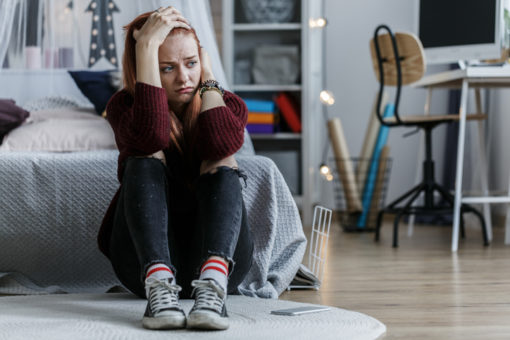The major depressive disorder affects more than 15 million adults in the United States and presents with feelings of sadness, sleep disturbance, loss of interest in activities, feelings of guilt, loss of energy, difficulty concentrating, changes in appetite, psychomotor agitation, grief, and even suicidal ideation. Depression among teenagers is a severe disorder that can lead to a lifetime of psychological illnesses and even to suicide. In fact, more than 10 percent of children will be diagnosed with depression before the age of 18. Depression is actually underdiagnosed in children and teenagers because parents often believe that their son or daughter is just moody and that this moodiness is transient. Depressed teenagers are more likely to become involved in alcohol and drug use, which can lead to criminal behavior. Depressed teenagers and children often exhibit symptoms differently than adults do. For example, a child or teenager who is depressed might refuse to go to school, isolate himself or herself, exhibit aggressive behavior, sleep more than usual or become involved with alcohol or drugs.

Antidepressant medication is usually the first step in the treatment plan for an individual with mild to moderate depression. Selective serotonin reuptake inhibitors (SSRIs) are the first-line medications that are prescribed to both teenagers and adults alike. SSRIs include the following:
- Citalopram (Celexa)
- Escitalopram (Lexapro)
- Fluoxetine (Prozac)
- Fluvoxamine (Luvox)
- Paroxetine (Paxil)
- Sertraline (Zoloft)
- Vilazodone (Viibryd)
- Vortioxetine (Brintellix
How do antidepressants work?
Antidepressants work by increasing the levels of neurotransmitters in the brain. Neurotransmitters such as serotonin and noradrenaline are released from brain cells and send signals throughout the mind and the body to regulate and improve an individual’s mood. SSRIs individually work by blocking the reabsorption of serotonin into the cells that released it, which means that more serotonin is available for the brain to access. Contrary to popular belief, there is no scientific evidence to suggest that depression is caused by a chemical imbalance. Antidepressants work by increasing levels of serotonin, but this doesn’t mean that depression is caused by a lack of.
Combine medication with psychotherapy
For some, depression treatment may only consist of taking antidepressant medication, but in fact treatment for depression is most effective when used in combination with psychotherapy. This is because antidepressants reduce the symptoms, but they do not tackle the underlying root cause of the mental illness. Although depression can be genetic, it is most often triggered over time by negative personal experiences associated with friends and family, romantic relationships, finance, school or work and loads more. Psychotherapy can help both you and your teenager to find a way to deal with these problems, including the introduction of healthy coping mechanisms which all work alongside antidepressant treatment.
Antidepressants are not the silver bullet
Antidepressants have been studied thoroughly in adults; however have not been tested in the pediatric and adolescent population, and therefore every physician will warn you that your teenager’s symptoms may get worse before they better. Additionally, it takes anywhere from two to six weeks before your teenager will begin to notice positive changes in his or her mood. The most common side effects of antidepressants are nausea, insomnia, anxiety, restlessness, dizziness, weight gain, dry mouth, sweating, upset stomach, headaches, agitation, and loss of appetite. Teenagers can experience worsened depression and suicidal thoughts during the initial adjustment period. These side effects tend to be worse during the first two weeks of initiating therapy.
Suicide risk
The worst side effect associated with antidepressants, especially in teenagers is increased of suicide. The reason this happens is that antidepressants increase energy levels, so if your teenager is already feeling suicidal, they may give him/her the energy to carry out the act physically. They may also intensify his/her low mood and trigger suicidal thoughts and feelings.
Be patient
Antidepressants take on average six weeks to work to their full potential and many times, dosages and medications must be switched for your teenager to have the best treatment. In the meantime, it is vital that you are in tune with any potential adverse side effects and report them to your provider and are also simultaneously undergoing psychotherapy to develop positive coping skills during this time.
Treatment could last a lifetime
Some individuals can be slowly weaned off their antidepressant medications and therefore view this treatment as a temporary measure for their depression. Although it is very possible for individuals to be weaned off these medications months or years into treatment, many individuals are better suited to take antidepressants on an on-going, and even a lifetime basis, as a means of keeping their mood more stable, or as a preventive measure.
